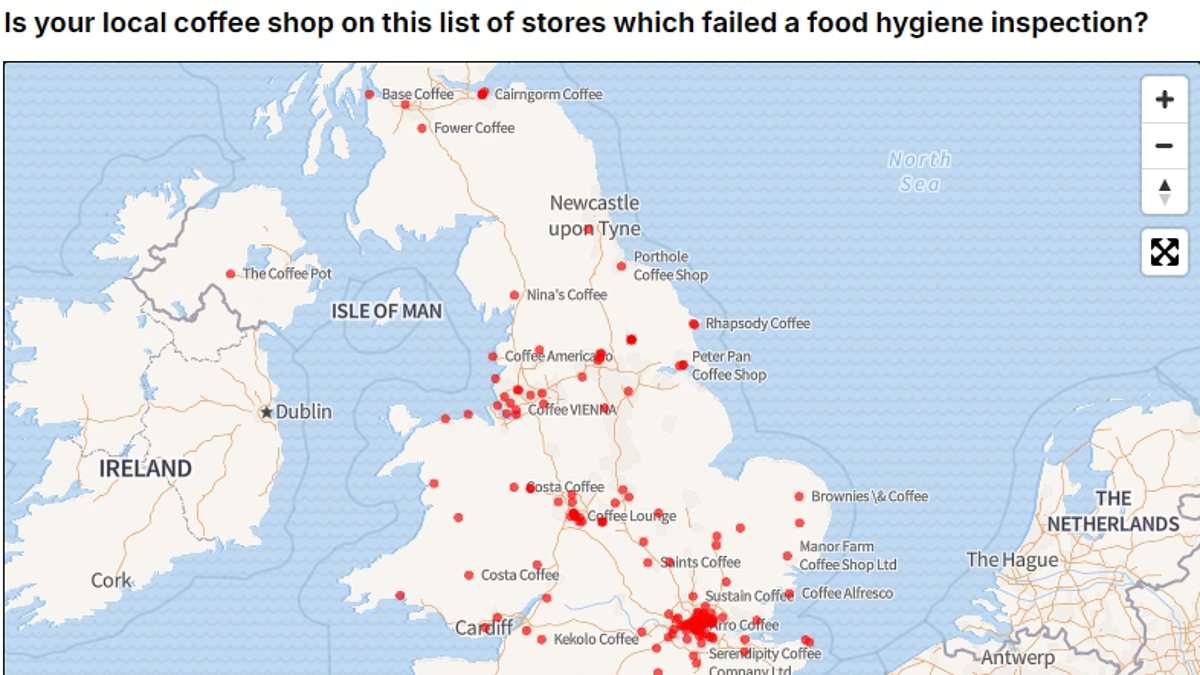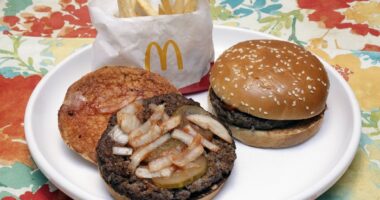Almost one in 50 coffee shops are so dirty they failed inspection, MailOnline can disclose today.
Seven cafes, including three dotted across inner London, scored zero out of five – the lowest possible rank.
Such scores are given to businesses that pose a risk to public health.
Inspectors can find rotting food, rodent droppings and unsafe food storage during visits.
More than 12,000 businesses across the UK sell coffee, according to watchdogs at the Food Standards Agency (FSA). Coffee shop is not its own category so venues selling coffee are recorded under several different labels. MailOnline searched ‘coffee’ and then searched for major brands to compile this list.
Major chains such as Costa and Starbucks are included in the database.
The vast majority have a rating of three or above, corresponding to a pass.
Businesses ranked between zero and two are regarded as having failed because, at the very least, ‘some improvement is necessary’.
MailOnline has today named and shamed all 207 coffee shops that failed inspection in our interactive map, allowing you to see whether your local has failed to reach a minimum standard.
One Costa branch in Aberdeen and another in Inverness were among the big names to have been judged unhygienic, as were Starbucks outlets at John Lennon Airport in Liverpool and one in Heathrow.
Another MailOnline map shows how pass rates vary across Britain.

The Food Standards Agency rates outlets which serve food or drink on a scale from 0-5. Firms receiving a rating of two or less require immediate improvement and in the most dire cases, can face prosecution. Picture posed by models

There are more than 12,000 coffee shops across the UK according to figures held by the Food Standards Agency
Every shop inspected in areas such as Cornwall, Amber Valley, Tonbridge Wells and Watford passed.
Birmingham, which is the UK’s largest local authority, had the largest number which failed – 23 out of 145, or 15.9 per cent.
Across England and Wales, 24 per cent of coffee shops in Walsall do not have a pass rating, compared with 23.8 per cent in Charnwood and 23.53 in Rugby.
Twelve authorities had failure rates of between 20 and 24 per cent, including tourist hotspots such as East Devon, North Devon and South Hams.
Almost 400 shops have yet to be inspected.
A coffee shop awaiting inspection might not be unsafe, although the customer does not have the reassurance that local authority environmental officers have visited the business and examined how they handle food.
Following any inspection, the local authority officers issue a report which is collated nationally by the FSA.
Results available on the FSA website are updated daily as additional inspections are made.
Businesses who fail can book a retest once they have rectified the issues in the initial report.
In the most serious cases, officers can close a business until improvements are made and can also recommend that a firm could face prosecution for breaching food standards regulations.
Earlier this month, the FSA revealed some retailers, including major supermarkets, are showing incorrect food standards ratings outside their premises.
However, concern has been raised about the reduction in the number of inspections on food premises due to council budget cuts.
Over the past decade, the number of food standards inspectors employed by local councils has fallen by 45 per cent.
The FSA and Food Standards Scotland (FSS) warned that staff shortages and cuts are ‘putting unsustainable pressure on existing local authority teams and may increase the risk of important food safety issues being missed’.
The joint statement warned that many of those working for the local authority food safety teams are approaching retirement age.
Both the FSA and FSS warned: ‘Our concern is that this reduced capacity to assess authenticity, labelling and allergens compliance may compromise food standards in the future.
‘Without enough people with the right skills to deliver essential food controls, it will be more difficult to identify, monitor and respond to risks to food safety, leaving consumers and businesses vulnerable.’










